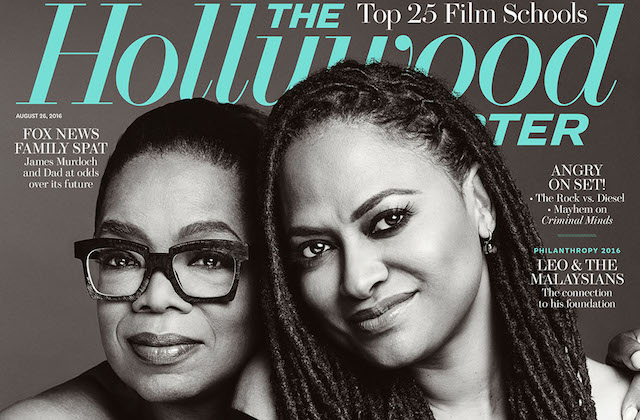Ava DuVernay and Oprah Winfrey cover the August 26 issue of The Hollywood Reporter, and the co-creators of OWN’s “Queen Sugar” used the space to talk about issues impacting Black women in entertainment. From denouncing the word “diversity” to the importance of working with people who value their voices, the interview is a master class in being a boss.
Here are some key excerpts from the story, which was posted online yesterday (August 17):
On Inclusion:
Winfrey: I used to use the word "diversity" all the time. "We want more diverse stories, more diverse characters…" Now I really eliminated it from my vocabulary because I’ve learned from her that the word that most articulates what we’re looking for is what we want to be: included. It’s to have a seat at the table where the decisions are being made.
On Black Lives Matter:
DuVernay: You see integration of Black Lives Matter from the beginning of [“Queen Sugar”] because it is literally Black lives having meaning and mattering in the everyday. With the Black Lives Matter movement, a lot of the focus is on the protest and dissent. I’m hoping to dismantle the public notion—for folks outside of the community—of what Black Lives Matter means. It’s really about saying that Black lives matter, that humanity is the same when you go inside people’s homes.
On Protecting Your Voice:
DuVernay: I’m in a space where I’m able to do the things that I want to do and the start of that was doing it on my own and working independently without permission. Even though I have more folks, more money and more infrastructure around me now, I made a decision [long ago] to work from a place of protecting my own voice by collaborating with people who nurture and value that—and not trying to spend my time knocking on doors that were closed to me, begging people for things that put me at a disadvantage because they had it and I didn’t.
Winfrey: Everybody gets caught up in the slogan and the hashtag and the protest. What we’re trying to do is get you to feel it. You get to feel it when Ralph Angel [Kofi Siriboe] is putting his son to bed, laying with him and reading a story. Intimacy and connection between a father and son? We’ve just not seen it [with Black characters on series TV].
DuVernay: All lives can’t matter to folks who are not us if you don’t know us, if you don’t understand [us]. I don’t make anything as education for anyone; I make it as a love letter to the characters: These are Black people; this is a Black family. It’s a window into that. The same way when I go see “A Separation,” an Iranian film about an Iranian family, or when I go to see a Korean film, it is a window into that world, and I see them, and I start to understand and value them. They begin to matter to me.
Read the full cover story here.
